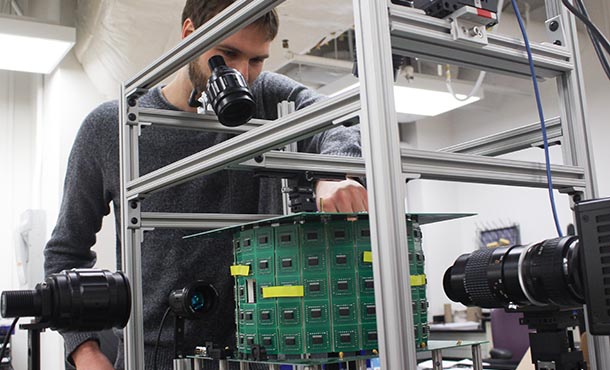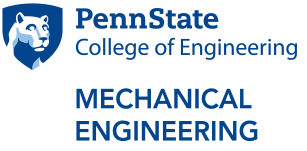
Jean-Michel Mongeau works with the virtual reality simulator for flying insects in his lab. IMAGE: ERIN CASSIDY HENDRICK/PENN STATE
Professor awarded Air Force Young Investigator grant
Mechanical engineering's Jean-Michel Mongeau to explore how insects can help autonomous aerial vehicles make adjustments on-the-fly
11/14/2019
By Erin Cassidy Hendrick
UNIVERSITY PARK, Pa. — The United States Air Force Office of Scientific Research recently awarded Jean-Michel Mongeau, assistant professor of mechanical engineering at Penn State, a prestigious Young Investigator Research Program (YIP) grant to investigate how flying insects adapt their flight maneuvers.
Established to spur creative and impactful avenues of research in science and engineering, the funding opportunity aims to enhance the development of early-career investigators and to ultimately support the underlying challenges facing the Air Force’s mission.
To further these goals, Mongeau’s proposal seeks to understand how flying insects adapt to uncertainties in their environment. The YIP grant provides Mongeau with $450,000 to explore this biological phenomenon.
“Unlike birds, insects can’t regrow their wings,” he said. “Therefore, if they’re missing a part of their appendage or they are injured, they have to use their brain to make adjustments to how they fly.”
Much like a person would adjust their walking gait while using crutches after an injury, previous research shows flies are also capable of learning new ways to fly.
“That means their brains are involved in sensing something is off and can rapidly compensate,” Mongeau said. “They do adapt, and they learn.”
His research project will create mathematical models of the insects’ behavior, build virtual reality simulators to observe their flight patterns and design custom instrumentation to gather data.
“We will be focusing our research on the fruit fly as genetic tools enable us to isolate the parts of the brain that might be involved in these learning processes,” Mongeau said.
The work attempts to further unravel the mysteries behind insect flight and develop bio-inspired algorithms for learning and adaptive control. Mongeau hopes to reverse engineer these biological processes and apply them to enhance the abilities of autonomous aerial systems.
“I am very grateful for the Air Force’s generous support,” he said. “This award will give me the ability to forge ahead in my research on adaptive control of locomotion and how the brain controls movement.”


